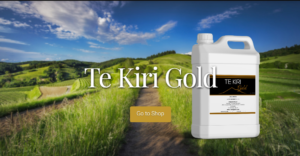A water-based tonic that is claimed to help treat cancer has been put under a critical spotlight by reporters at the NZ Herald and the Waikato Times.
 Te Kiri Gold is marketed by Taranaki dairy farmer Vernon Coxhead as an organic liquid that acts in a similar way to the body’s immune system. But at $100 for 2 litres – $1700 for an eight-week course – medical experts have said the product is effectively diluted bleach.
Te Kiri Gold is marketed by Taranaki dairy farmer Vernon Coxhead as an organic liquid that acts in a similar way to the body’s immune system. But at $100 for 2 litres – $1700 for an eight-week course – medical experts have said the product is effectively diluted bleach.
Most famously, Sir Colin Meads told media last year that Te Kiri Gold had helped set him on the way to recovery from pancreatic cancer. However, he told the Waikato Times, “I thought it had cured me, but it hadn’t”.
The NZ Herald commissioned an independent laboratory to test Te Kiri Gold, which revealed the product contains high amounts of salt and chlorine and does not meet the Government’s safe drinking water guidelines.
Massey University’s Dr Nick Kim said the content of free chlorine in the sample was 220 times higher than the limit applied to NZ drinking water and a daily dose of Te Kiri Gold would be equivalent to about one-and-a-half times the recommended daily salt limit.
“If I had cancer I wouldn’t take this product. I can’t see any health benefit from swallowing solution with diluted bleach and a high concentration of salt.”
Victoria University of Wellington’s Dr Shaun Holt, who studies natural medicines, told the Waikato Times he wished celebrities like Meads would refrain from commenting on unproven medicines. “Even if he retracts these comments down the line, people will use these comments for years to come.”
He said the claimed clinical trial of the product was “light years away” from meeting national or international standards for such trials. “There’s absolutely zero excuse. No researcher with any sort of ethical behaviour or credibility would consider doing medical research without going through the ethics committee.”
The Cancer Society’s medical director Dr Chris Jackson told the NZ Herald the society would not recommend the product because it was not licensed.
“Any organisation selling a medical treatment that claims to cure cancer, before they have been through clinical trials to test and prove safety and effectiveness, is misleading and potentially dangerous.”
NZ Herald:
- Water-based product Te Kiri Gold used by rugby great Sir Colin Meads does not meet the Government’s safe drinking water guidelines
- Te Kiri Gold investigation: Selling hope of a cancer cure – Inside ‘magic water’ factory
- Te Kiri Gold investigation: Medical experts versus hope
Waikato Times: